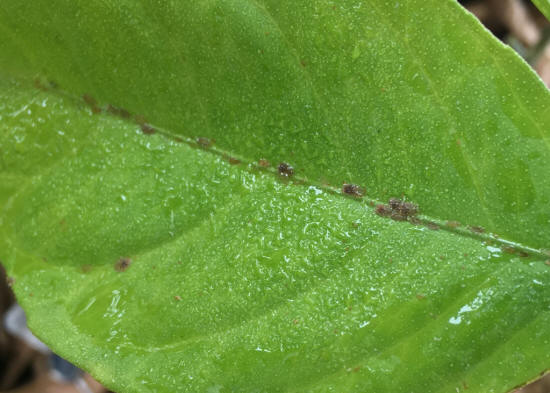|
 Managing
a Difficult Insect Pest on Houseplants Managing
a Difficult Insect Pest on Houseplants
by Melinda Myers
 Send a link to a friend
Send a link to a friend
[January 27, 2021]
A sticky substance on plant leaves, plant
stands, and the floor are often the first clue alerting gardeners to
a problem. If a closer look reveals bumps on the upper and lower
surface of leaves and stems, it means scale insects have moved in to
dine on your houseplants. Severe infestations can cause leaf
yellowing, stunting and dieback of the plant.
|
|
 If you have battled these insects, you know they
can be challenging to control. Arm yourself with an understanding of
their lifecycle and be persistent to successfully manage these
pests. If you have battled these insects, you know they
can be challenging to control. Arm yourself with an understanding of
their lifecycle and be persistent to successfully manage these
pests.
Scale insects have needle-like mouthparts that allow them to pierce
the leaf and stem surfaces. They suck plant sap through a tube-like
structure just as if they were drinking from a straw. These are one
of several insects that secrete drops of a clear, sticky substance,
called honeydew, as they feed. A black fungus known as sooty mold
may grow on the honeydew. It does not directly harm the plant, but
it looks bad. In severe cases, sooty mold can prevent sunlight from
reaching the leaves, causing them to yellow.
Adult scale insects form coverings that protect them from adverse
environmental conditions and most chemical controls. Eggs hatch
under this protective covering and the immature scale, called
crawlers, emerge looking for a place to feed. Once settled, the
crawler continues to grow, shedding layers of skin. These layers of
shed skin, or waxy layers, form their protective covering.

Isolate infected plants as soon as you discover the problem. This
will reduce the risk of this pest spreading to your other plants.
You can remove the adult scales with a toothpick, tweezers, or an
old toothbrush. Repeat every few weeks until you have this pest
under control. This may be sufficient to control small populations,
but if you miss even one adult the problem persists.
The crawler stage is the most susceptible to chemical control. You
will need a hand lens or magnifying glass to see these short-lived
crawlers. Insecticides and washing small plants with a plant-safe
soapy water solution can help manage small populations. Cover the
pot and soil to prevent any scale knocked off during the bath from
crawling back onto the plant.
[to top of second column] |

Increase your chance of success with the help of an
organic insecticide like Summit Year-Round Spray Oil (SummitResponsibleSolutions.com).
This lightweight oil suffocates and controls all stages of the scale
insect, including the adult and eggs housed under the protective
covering. Repeat applications are needed to get this insect under
control.
This product is safe for people and pets while harmful to this and
other houseplant pests. As always read and follow label directions
for the most effective results.
Clean the pot, saucers, plant stands and the area around infected
plants to remove any honeydew and unseen crawlers. This along with
proper control will reduce the risk of these insects infesting
treated and nearby plants.
Continue to monitor all your plants for scale and other insects each
time you water. It is much easier to manage small populations than
larger infestations on more plants.
Melinda Myers has written more than 20 gardening books, including
Small Space Gardening. She hosts The Great Courses “How to Grow
Anything” DVD series and the nationally-syndicated Melinda’s Garden
Moment TV & radio program. Myers is a columnist and contributing
editor for Birds & Blooms magazine and was commissioned by Summit
for her expertise to write this article. Myers’ web site is
www.melindamyers.com.
[Photo credit: photo courtesy of
MelindaMyers.com]
 |